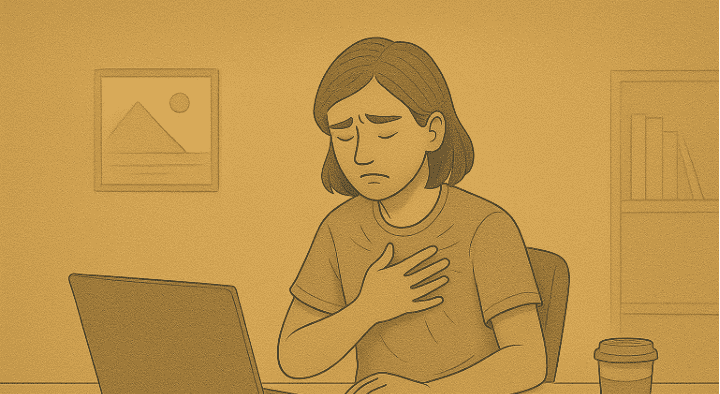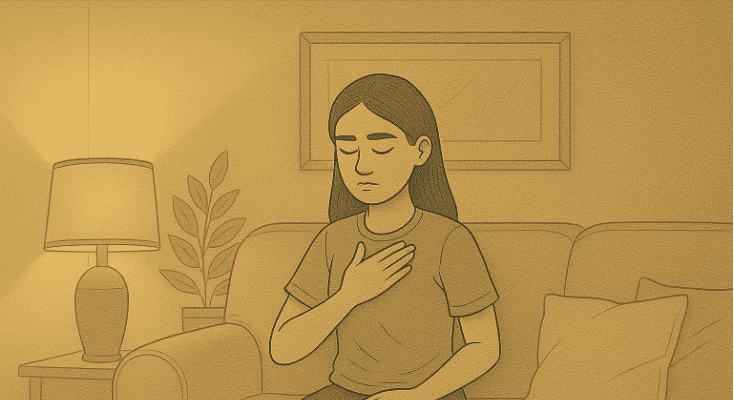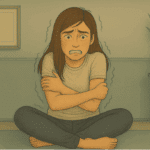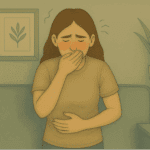Key Takeaways
- Anxiety is a natural response, not a flaw; understanding fight-or-flight helps you face anxious moments with self-compassion and practical coping strategies.
- Breathing exercises like box breathing, diaphragmatic breathing, and long exhales calm the nervous system and lower stress quickly.
- Physical actions, posture shifts, stretching, movement, cold exposure, or progressive muscle relaxation, release tension and signal safety to your body.
- Mental grounding and sensory tools, including the 5-4-3-2-1 method, reality checks, fidget objects, aromatherapy, or calming sounds, redirect focus to the present.
- When anxiety persists or interferes with daily life, A Mission For Michael (AMFM) offers personalized, evidence-based care with holistic therapies, residential and outpatient programs, and expert support to help rebuild wellness, resilience, and confidence.
Anxiety Strikes: What’s Really Happening in Your Body and Mind
When anxiety hits, your body’s fight-or-flight response kicks in, releasing stress hormones like cortisol and adrenaline. This ancient survival mechanism once helped humans react quickly to real threats, but today, it can be triggered by everyday stressors like deadlines or financial worries.
Your breathing quickens, muscles tense, and your heart races as your body prepares for danger that isn’t actually there. These physical reactions fuel the mental symptoms we recognize as anxiety, racing thoughts, restlessness, and a sense of dread.
Recognizing that anxiety is a natural biological response, not a personal flaw, is the first step toward managing it with greater understanding, self-compassion, and effective calming strategies.
Founded in 2010, A Mission For Michael (AMFM) offers specialized mental health care across California, Minnesota, and Virginia. Our accredited facilities provide residential and outpatient programs, utilizing evidence-based therapies such as CBT, DBT, and EMDR.
Our dedicated team of licensed professionals ensures every client receives the best care possible, supported by accreditation from The Joint Commission. We are committed to safety and personalized treatment plans.
Quick Breathing Techniques to Calm Your Nervous System
Breathing exercises are one of the most effective ways to calm anxiety because they directly influence your nervous system. When you’re anxious, your breathing becomes shallow and rapid, reinforcing stress. By slowing and deepening your breath, you signal to your brain that it’s safe to relax.
Popular Techniques Include
- Box breathing: Equal counts for inhale, hold, exhale, and pause
- Diaphragmatic breathing: Deep belly breathing that engages the diaphragm
- Long exhale breathing: Making the exhale longer to activate relaxation
- 4-7-8 breathing: Inhale for 4, hold for 7, exhale for 8
- Alternate nostril breathing: A yogic method to balance the nervous system
Box Breathing: The 4-Second Method
Used by Navy SEALs and mindfulness experts, box breathing follows a simple 4-second rhythm: inhale, hold, exhale, hold. Practicing this pattern can lower your heart rate and stress hormones while keeping your mind focused and steady.
Diaphragmatic Breathing: Engaging Calm
Also known as belly breathing, this technique activates the vagus nerve, your body’s “calm switch.” Place one hand on your chest and the other on your belly. As you inhale, let your belly rise while your chest stays still. Regular practice strengthens your natural ability to stay calm under pressure.
The Long Exhale Technique: Quick Relief
Inhale for 4 counts, then exhale for 6–8 counts. The longer exhale boosts the parasympathetic response, quickly lowering heart rate and easing tension. Even a minute of practice can help you regain a sense of control and relaxation.
5 Physical Actions That Break the Anxiety Cycle

Observing your anxiety without judgment, such as naming your feelings, reduces emotional intensity and creates psychological distance.
When anxiety hits, your body locks into tension patterns that reinforce fear. Breaking this cycle through movement helps release stress, improve blood flow, and shift focus from anxious thoughts to physical sensations. Even small actions can tell your brain it’s safe to relax and deactivate the fight-or-flight response.
1. Change Your Posture
Your body language and emotions are deeply connected. When anxious, people often hunch their shoulders or close off their posture. Try opening up, pull your shoulders back, lift your chest, and ground your feet. This simple adjustment increases confidence-boosting hormones and lowers cortisol. Holding a “power pose”, arms raised in a victory “V”, for just two minutes can noticeably ease tension and restore calm.
2. Stretch It Out
Anxiety often hides in your muscles, especially around the neck, shoulders, and jaw. Gentle stretching helps release that tightness. Roll your shoulders backward and forward, tilt your head from side to side, and gently open your jaw. Even subtle wrist or ankle rotations can restore circulation and remind your body it’s safe to relax. These micro-movements are easy to do at work, in public, or anytime you feel tension building.
3. Try Progressive Muscle Relaxation
Progressive Muscle Relaxation (PMR) involves tensing and then releasing each muscle group, from your feet up to your face. This method teaches you to recognize tension before it escalates and to consciously let go of it. Studies show PMR can reduce anxiety symptoms when practiced regularly, helping you feel both grounded and more in control during anxious moments.
4. Use Cold Water to Reset
Cold exposure quickly calms the nervous system by activating the body’s “dive reflex,” which slows the heart rate and conserves energy. Splash your face with cold water or press an ice pack against your cheeks for 30 seconds. This physical jolt helps interrupt panic symptoms almost instantly. Keeping a small spray bottle of cool water nearby can provide a quick, subtle reset when stress spikes unexpectedly.
5. Move for Two Minutes
Movement is one of the fastest ways to clear out stress hormones like adrenaline and cortisol. Just two minutes of brisk walking, marching in place, or doing light jumping jacks can release endorphins and restore balance to your body. You don’t need a full workout; even short bursts of movement can break the anxiety loop and bring your mind back to the present.
Mental Grounding Exercises You Can Use Anywhere
Mental grounding techniques help anchor you in the present when anxiety pulls you into past regrets or future worries. These exercises engage sensory and logical brain pathways, temporarily quieting the emotional centers that fuel anxiety. Unlike physical techniques, grounding targets racing thoughts, catastrophic predictions, and mental spirals.
The 5-4-3-2-1 Sensory Method
The 5-4-3-2-1 method uses all five senses to bring your attention to the present. Identify five things you can see, four you can touch, three you can hear, two you can smell, and one you can taste. Engaging multiple senses occupies your brain, leaving less room for anxious thoughts, while the counting adds structure and predictability, giving you a sense of control.
Reality-Checking Your Thoughts
Anxiety often distorts thinking, exaggerating threats. Ask yourself: “What’s the evidence for and against this thought?” “Am I confusing possibility with probability?” “What advice would I give a friend?” This technique activates your rational prefrontal cortex, calming the fear-driven amygdala. Keep these questions handy on a card or phone note for quick reference during anxious moments.
Sensory Tools to Redirect Your Focus
Our senses provide direct pathways to interrupt anxiety by offering alternative stimuli that compete with anxious sensations. These techniques work quickly by engaging primitive neural pathways, bypassing overthinking, and creating immediate relief.
Touch: Comfort Objects and Pressure
Tactile sensations anchor you in the moment. Keep small textured objects, stress balls, smooth stones, or fabric swatches, to focus on instead of anxious thoughts. Applying gentle pressure, like hugging your arms, activates your parasympathetic nervous system and signals safety, reducing anxiety within seconds.
Smell: Aromatherapy
Scents like lavender, chamomile, bergamot, or sandalwood can calm emotional centers in the brain. Carry a small essential oil, scented lotion, or tea bag for quick access. Inhale slowly and focus on the scent to combine neurological effects with deep breathing, reducing anxiety in 30–60 seconds. Unscented options like coffee beans or cinnamon work well in shared spaces.
Sound: Audio Anchors
Sound can shift your mental state rapidly. Create a short “emergency calm” playlist with nature sounds, relaxing music, or binaural beats. When headphones aren’t an option, humming, singing quietly, or repeating a calming mantra stimulates the vagus nerve, engages the parasympathetic system, and interrupts anxious cycles.
Leaning Into Anxiety Instead of Fighting It
Counterintuitively, fighting against anxiety often increases its intensity. The more you resist uncomfortable sensations, the more your brain flags them as dangerous, creating a secondary anxiety about the anxiety itself. Acceptance-based approaches like mindfulness encourage you to observe anxiety without judgment, reducing its power over you.

Deep breathing exercises regulate your nervous system, lowering stress hormones and helping you feel calm within minutes.
Try naming your anxiety when it appears, which research shows creates psychological distance and reduces emotional reactivity. Remind yourself that anxiety is a normal biological response, not a personal failure. This shift in perspective from “I am anxious” to “I am experiencing anxiety” can significantly reduce suffering during anxious episodes.
Paradoxical intention, a technique where you briefly lean into anxious sensations instead of fighting them, can short-circuit the anxiety response. If your heart is racing, try thinking, “Go ahead, heart, beat even faster” for a few seconds. This often triggers a natural contrary response where symptoms begin to subside. The approach works by interrupting the fear-of-fear cycle that perpetuates anxiety.
Build Your Personal Emergency Anxiety Kit
A personalized anxiety kit gives you immediate access to tools that help you manage anxiety when it strikes. It combines physical items and digital resources specific to your triggers, reducing stress during intense moments and providing psychological comfort.
Physical Kit Essentials
Keep your kit compact, in a purse, backpack, or pocket. Include items like a small essential oil or scented lotion, a textured fidget object, a notecard with breathing instructions, a cooling mint or gum, and earplugs or headphones. Personal touches, like a photo of a loved one or a small token of security, can boost reassurance. For privacy, store items in a mint tin or pencil case.
Digital Resources
Supplement with smartphone tools: guided meditation apps, a personalized anxiety action plan, a “Calm Down” playlist, positive photos, or bookmarked articles. Use reminders for daily deep breathing and apps for quick cognitive exercises and grounding techniques. Having both physical and digital tools on hand ensures you’re prepared to manage anxiety anytime, anywhere.
When These Techniques Aren’t Enough: Recognizing When to Get Help
While grounding, breathing, and self-regulation strategies can be powerful, sometimes anxiety persists despite your best efforts. If it begins to disrupt your work, relationships, or overall quality of life for more than a couple of weeks, it may be time to seek professional support. Warning signs include frequent panic attacks, avoiding important activities, or turning to unhealthy coping methods.
Therapy as a Next Step
Professional therapy offers structured, evidence-based tools to help you understand and manage anxiety at its root. Cognitive Behavioral Therapy (CBT) remains one of the most effective treatments, teaching you how to challenge anxious thought patterns and build healthier responses. Acceptance and Commitment Therapy (ACT) helps you face discomfort with compassion, while mindfulness-based therapies cultivate lasting calm and resilience.
If in-person therapy feels daunting, many clinicians now offer teletherapy or online sessions, providing privacy and flexibility from home. Don’t wait for anxiety to become overwhelming; early intervention leads to faster, more sustainable progress.
Professional Support With AMFM: When Anxiety Needs Extra Care
A Mission for Michele (AMFM) Mental Health Treatment provides personalized, evidence-based care for individuals struggling with anxiety, depression, trauma, and other mental health challenges. Their approach focuses on the whole person, combining clinical expertise with compassion to foster lasting wellness.

Personalized care at AMFM ensures that each client receives the right support for their unique needs.
Why Choose AMFM:
- Full continuum of care: Residential, Partial Hospitalization (PHP), Intensive Outpatient (IOP), and virtual outpatient programs
- Specialization in complex psychiatric and co-occurring conditions
- 2:1 staff-to-client ratio for personalized attention
- Evidence-based and holistic therapies: CBT, EMDR, ACT, art, and animal-assisted therapy
- Comfortable, home-like treatment environments promoting safety and connection
- Partnership with the Beck Institute, providing world-class CBT and recovery-focused therapies
- Integrated focus on mental, emotional, and physical wellness
- Insurance guidance and confidential support to make care accessible
In addition to clinical excellence, AMFM’s philosophy emphasizes “treatment persistence”—the belief that no one is treatment-resistant, only in need of the right approach and continued support. Their programs integrate nutrition, physical wellness, and emotional resilience to help clients rebuild confidence and rediscover joy.
With locations in California, Minnesota, Virginia, and Washington state, AMFM continues to expand its mission of Compassionate, Evidence-Based Mental Health Care for Lasting Wellness.
Frequently Asked Questions (FAQs)
How quickly should these anxiety techniques work?
Most physical techniques like deep breathing or cold exposure begin easing anxiety within 2–5 minutes. Results depend on your stress level and familiarity with the method. With consistent practice, your body responds faster, often reducing symptoms in under two minutes.
Can I use these techniques for panic attacks too?
Yes. For panic attacks, focus on slow breathing, cold exposure, and grounding (like the 5-4-3-2-1 technique). These calm your body’s stress response. Start with one method at a time and keep it simple to avoid feeling overwhelmed.
What if I can’t find privacy to practice these techniques?
You can use most techniques discreetly. Subtle breathing, silent grounding, or fidget tools in a pocket work well in public. When possible, step aside briefly, like to a restroom or car, for a minute of focused breathing or stretching.
Is it possible to prevent anxiety attacks before they start?
Absolutely. Learn to spot early warning signs like muscle tension or racing thoughts, then use grounding or breathing exercises early. Regular mindfulness, sleep, and exercise help prevent buildup. Tracking patterns through apps can reveal triggers and support prevention.
What should I do if my anxiety doesn’t improve with self-help techniques?
If anxiety persists despite self-help, professional care can help. AMFM offers personalized, evidence-based programs, combining therapies like CBT, EMDR, and ACT with residential or outpatient options to build resilience, coping skills, and lasting wellness.












